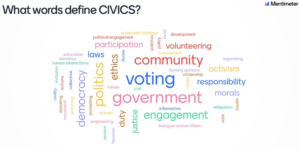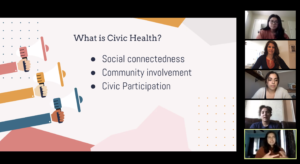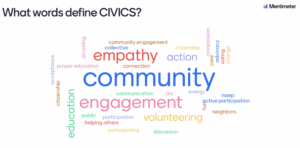Is Cyber Civics a Possibility? A Reflection on Experiential Learning during a Pandemic
By Heather Vaughn, University of Texas at Austin
Can a pandemic that separates us from each other revive a sense of community and revive our spirit of connectedness? My experience teaching college students last spring suggests the answer is yes.
In January 2020, my students entered our classroom at the Moody College of Communication with curiosity about the new path we would embark on together. The Communicating for Civic Engagement course that was bringing us together had never been offered, and RUReady Texas that the students were joining — an expansion of the RUReady high school mentoring program at the Center for Youth Political Participation at Rutgers University, led by Dr. Elizabeth Matto — had never existed in Austin. We were all newcomers, and we spent the first day learning about students’ civic identities as we explored the results of the most recent Texas Civic Health Index.
At that first meeting, the class defined civics based on their personal experiences and ideas (see figure 1.1 below).

Over the next eight weeks, we dove into the demographics of Austin and their impact on the city, pondered how education helps people become good citizens, and struggled with whether civic education is a right. My students also supported the Speak Up Speak Out State Civics Fair, a competition that allows 3–12 graders to present their solutions to community issues for a panel of judges at the Texas State Capitol.
As Spring Break approached, COVID-19 began to shut down the state. I, along with other faculty and staff, were asked to quickly move all courses online before students returned (virtually) from the extended break.
Simultaneously, staff at the Ann Richards School for Young Women Leaders were retooling classes for middle and high school students. Sharon Roy and Jill Dicuffa at the Ann Richards School made this possible by enthusiastically joining and advocating for RUReady Texas to serve their students. We worked out a plan through which our students could mentor Ann Richards School students on civic engagement without disrupting their new, mostly voluntary schedule. Civic engagement typically relies on in-person interaction, but COVID-19 forced us to creatively engage in live Zoom calls (see figure 1.2 below) and with flipped lessons created by my students.

Over the disrupted semester, the university students and the Ann Richards School students all showed a strong preference to be and learn in a space together. Both sets of students expressed a need for more “facetime” together, both in the civic mentorship and with their own classmates and instructor.
The experience also showed that consistent and regular meetings build relationships. My university students craved our discussion-based classes, whether they were online or on campus. They wanted more time to work with the high school students, even as scheduling became our biggest hurdle. Ann Richards School students wanted more opportunities to explore ideas, present, and gather feedback from their UT mentors.
Project-based learning online requires adaptability and creativity. My university students pivoted from their original classroom visit plans to create asynchronous video and digital lessons on issues in the community, self-care strategies, and civic health in our state. Using both asynchronous lessons and live project discussion classes, Ann Richards School students then created action plans that addressed specific community issues, and they learned ways to become more informed and involved citizens. Every student navigated new platforms and strengthened skills, beginning mentorships online and practicing learning from home.
At the end of the semester, my students and I reconvened on how, after this experience, they now defined civics (see figure 1.3). Many words remained the same, but the emphasis clearly shifted — from voting and government to community, engagement, and empathy.

Such shifts in perspective can drive positive action. Having seen it in my students, I am hopeful that a greater focus on community will carry us through a global pandemic and beyond.
Learn more about the CYPP RU Ready National Program.

